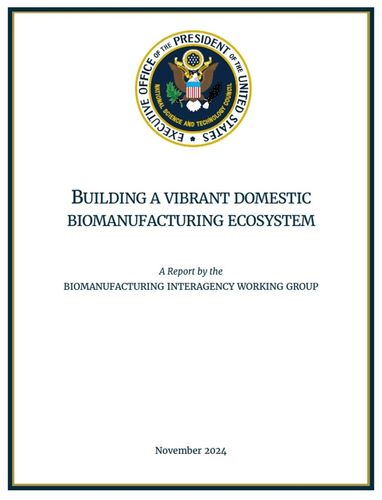White House releases interagency report to advance biotechnology and biomanufacturing for robust economic growth

SOURCE: U.S. Department of Energy
November 19, 2024
BY U.S. Department of Energy
The Biden-Harris administration released a new report, Building a Vibrant Domestic Biomanufacturing Ecosystem, to advance biotechnology and biomanufacturing as part of a broader national bioeconomy implementation plan. This announcement follows the 2022 National Biotechnology and Biomanufacturing Initiative (NBBI) Executive Order 14081 signed by President Biden to establish a strategic direction for domestic biomanufacturing expansion in the United States.
The Building a Vibrant Domestic Biomanufacturing Ecosystem report was created by the Biomanufacturing Interagency Working Group, established to assess U.S. domestic biomanufacturing production capacity to determine the challenges associated with expanding capacity, identifying the research and development needs, and policy goals. The Working Group includes representatives from the Department of Energy (DOE), Department of Agriculture, Department of Commerce, Department of Defense, Department of Health and Human Services, National Aeronautics and Space Administration, National Institute of Standards and Technology, National Science Foundation, National Security Council, Department of State, Department of Veterans Affairs, and the Office of Science and Technology Policy.
Advertisement
According to this new White House report, the U.S. bioeconomy is predicted to grow at a rapid pace over the next two decades, adding hundreds of thousands of well-paying jobs across nearly every sector of the economy. The report outlines the current state of U.S. biomanufacturing, as well as known gap areas, key drivers and policy needs that should be considered to expand domestic biomanufacturing capacity for products spanning the health, energy, agriculture, and industrial sectors with a focus on advancing equity, improving biomanufacturing processes, and connecting relevant infrastructure.
“Four key drivers potentially impact bioenergy manufacturing production capacity: economics, technology, infrastructure, and workforce,” said Jeff Marootian, Principal Deputy Assistant Secretary in the Office of Energy Efficiency and Renewable Energy, DOE. “We know we need a strategy based on these four fronts to meet the growing demand for biomanufactured products. This will, in turn, create a vibrant bioeconomy with great, clean-energy jobs, high-tech environmental solutions, and long-term economic benefits for people, industry and institutions.”
Advertisement
The research and development resources identified in this report will be critical to the U.S. government in guiding these strategic decisions and policies to not only sustain but grow the U.S. bioeconomy. By investing in and growing the biomanufacturing industry, the nation is enabling these innovative technologies and products to reach markets faster and establish the U.S. as a leader in the global bioeconomy.
For more information, view the full report and DOE’s fact sheet on Biotechnology & Biomanufacturing.
Related Stories
The biodiesel industry has been facing turbulence, but the release of long-overdue policy could course-correct.
The U.S. House of Representatives early on May 22 narrowly passed a reconciliation bill that includes provisions updating and extending the 45Z clean fuel production tax credit. The bill, H.R. 1, will now be considered by the U.S. Senate.
U.S. EPA Administrator Lee Zeldin on May 21 stressed the agency is working “as fast as humanly possible” to finalize a rulemaking setting 2026 RFS RVOs during a hearing held by the U.S. Senate Committee on Environment and Public Works.
Clean Fuels Alliance America on May 22 delivered a letter to U.S. EPA Administrator Lee Zeldin, urging him to set the 2026 RFS biomass-based diesel volume at no less than 5.25 billion gallons and allow continued growth in the 2027 volumes.
A group of 28 House members on May 16 sent a letter to President Donald Trump urging his administration to adopt timely, robust Renewable Fuel Standard renewable volume obligations (RVOs) for 2026 and beyond.
Upcoming Events










